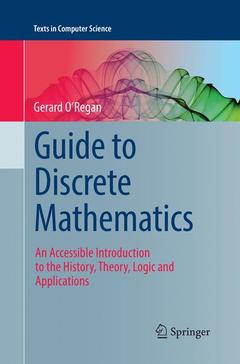Description
Guide to Discrete Mathematics, Softcover reprint of the original 1st ed. 2016
An Accessible Introduction to the History, Theory, Logic and Applications
Texts in Computer Science Series
Author: O'Regan Gerard
Language: English
Subjects for Guide to Discrete Mathematics:
Support: Print on demand
Description
/li>Contents
/li>Biography
/li>Comment
/li>
Mathematics in Civilization.- Sets, Relations and Functions.- Number Theory.- Mathematical Induction and Recursion.- Sequences, Series and Permutations and Combinations.- Algebra.- Automata Theory.- Matrix Theory.- Graph Theory.- Cryptography.- Coding Theory.- Language Theory and Semantics.- Computability and Decidability.- A Short History of Logic.- Propositional and Predicate Logic.- Advanced Topics in Logic.- Software Engineering Mathematics.- Formal Methods.- Z Formal Specification Language.- Probability, Statistics and Applications.
Dr. Gerard O'Regan is a CMMI software process improvement consultant with research interests including software quality and software process improvement, mathematical approaches to software quality, and the history of computing. He is the author of such Springer titles as Introduction to the History of Computing, Pillars of Computing, Introduction to Software Quality, Giants of Computing, and Mathematics in Computing.
Presents a broad and accessible introduction to discrete mathematics
Provides an introduction to logic, covering historical developments
Presents a strong focus on applications to coding and graph theory, formal methods, databases, and software reliability
Offers such pedagogical features as key topics, chapter summaries, review questions, a glossary and index
Includes supplementary material: sn.pub/extras




